 | |
| Author | Ian Hay |
|---|---|
| Country | United Kingdom |
| Language | English |
Publication date | 1911 |
| Media type | |
A Safety Match is a 1911 novel by the British writer Ian Hay. [1] In 1921 it was adapted by Hay into a play of the same title.
 | |
| Author | Ian Hay |
|---|---|
| Country | United Kingdom |
| Language | English |
Publication date | 1911 |
| Media type | |
A Safety Match is a 1911 novel by the British writer Ian Hay. [1] In 1921 it was adapted by Hay into a play of the same title.
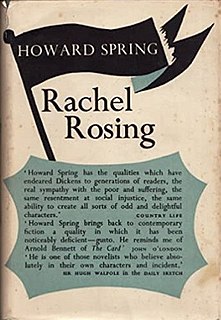
Rachel Rosing is a 1935 novel by the British writer Howard Spring. It is the sequel to Shabby Tiger, published the previous year (1934).
The Glasgow Evening News was an important Scottish newspaper in the early 20th century. It was founded as the Glasgow Evening Post in 1866 and became the Evening News in 1915.
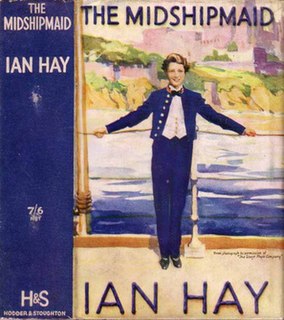
The Midshipmaid is a 1933 comedy novel by the British writer Ian Hay. It is based on his 1931 play The Midshipmaid, co-written with Stephen King-Hall, about the visit of an economic expert to the British fleet to see what cuts can be made and the adventurous flirtation of his daughter with the ship's officers.

Pip is a 1907 novel by the British writer Ian Hay. His debut work, its title hero is a schoolboy.

I Met a Lady is a 1961 novel by the British writer Howard Spring. During the First World War a boy is sent from Manchester to stay in Cornwall due to improve his health. There he meets an unusual group of characters who influence him strongly and intertwine with his life over the coming decades.
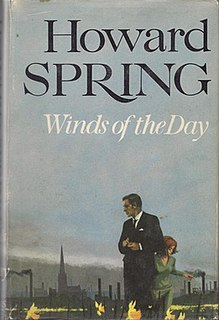
Winds of the Day is a 1964 novel by the British writer Howard Spring. It was Spring's final novel.

All the Day Long is a 1959 novel by the British writer Howard Spring. As with many of his works, it is set in Cornwall and Manchester during the Victorian era.

A Sunset Touch is a 1953 novel by the British writer Howard Spring.
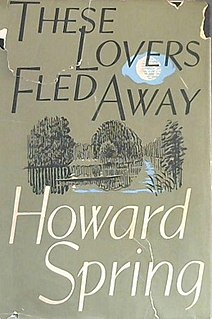
These Lovers Fled Away is a 1955 novel by the British writer Howard Spring. While some events take place in the same fictitious Yorkshire town as the 1957 novel Time and the Hour, it is not considered to be a sequel.
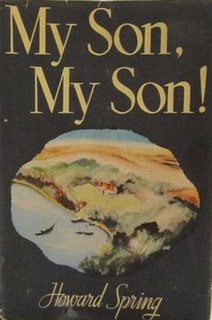
My Son, My Son is a 1938 novel by the British writer Howard Spring.

Time and the Hour is a 1957 novel by the British writer Howard Spring. It is set in the Bradford area. The title is taken from a line of Shakespeare's Macbeth.
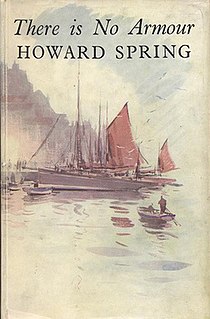
There Is No Armour is a 1948 novel by the British writer Howard Spring.

King's Mate is a 1928 romantic adventure novel by the British writer and explorer Rosita Forbes. While staying in Morocco a young Englishwoman becomes lost in the desert and is rescued by a mysterious figure known as the White Sheik, who proves to be an Englishman.
The Woman in the Hall is a 1939 novel by the British writer Gladys Bronwyn Stern. The lifestyle of a confidence trickster mother has a psychologically disturbing effect on her daughter who she uses as an essential part in her various swindles.

The Day They Robbed the Bank of England is a 1959 crime novel by the British writer John Brophy.

Turn the Key Softly is a 1951 novel by the British writer John Brophy. It follows the lives of three women in the first dozen hours after they are released from prison.

Gentleman of Stratford is a 1939 historical novel by the British writer John Brophy. It is a fictional account of the life of William Shakespeare. Brophy carefully researched the novel to use existing documentary evidence about the playwright. The novel was published in the United States by Harper. It helped launch Brophy's career as a novelist. Author Hugh Walpole described it as "the best biographical novel yet written about Shakespeare".
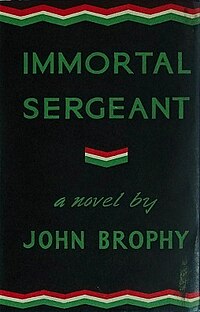
Immortal Sergeant is a 1942 war novel by the British writer John Brophy. The novel is set during the North African campaign of the Second World War and seen through the eyes of a British corporal fighting across the Libyan desert whose comrade, a sergeant, is killed.
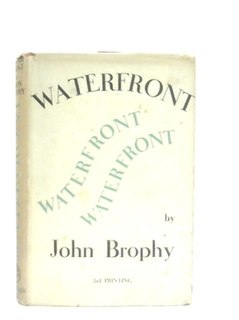
Waterfront is a 1934 crime drama novel by the British writer John Brophy. It is set in his native Liverpool amongst the world of dockworkers.

Target Island is a 1944 war novel by the British writer John Brophy. It was published by Collins in London and Harper in New York. It takes place during the Axis Siege of Malta during the Second World War. While popular, it did not repeat the great success of Brophy's previous novel Immortal Sergeant set during the North African Campaign. John Hampson writing in The Spectator gave it a fairly negative review alongside Vicki Baum's Berlin Hotel and noted "here again are major and minor figures, love-affairs, raids, and alarms, amid the panoply of modern war. And yet nothing has been added to the epic of Malta that we didn't already know. However, its film possibilities will be obvious to the cinema fan". In the event the novel was not adapted for the screen unlike several others of Brophy's work, although much of its settings and themes featured in the 1953 film Malta Story.